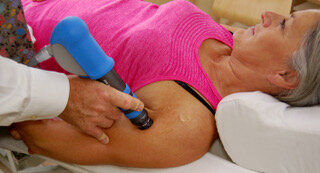Primary shoulder adhesive capsulitis (pSAC) otherwise interpreted as Frozen shoulder occurs without any known precipitating cause. According to the American Shoulder and Elbow Surgeons pSAC is defined as a condition of uncertain etiology characterized by significant restriction of both active and passive shoulder motion that occurs in the absence of a known intrinsic shoulder disorder.
There are a number of predisposing conditions for developing pSAC / frozen shoulder including prolonged shoulder immobility secondary to trauma or surgery. There is also evidence that the use of protease inhibitors as antiretroviral therapy may predispose to the development of pSAC.
Diagnosis is based on the clinical features of the disease.
The four clinical stages of frozen shoulder (pSAC) are defined as follows:
Painful stage (3 months) with aching pain and moderate limitation of the range of motion
Freezing stage (3-9 months) with severe pain and reduction of ROM;
Frozen stage (9-14 months) with predominant stiffness that may be accompanied by pain;
Thawing stage (15-24 months) with minimal pain and gradual improvement of ROM.
Biopsies of the shoulder capsule from patients with frozen shoulder pSAC showed the following stage-related pathologies: synovitis and capsular hypertrophy during the painful stage, perivascular synovitis and disorganized collagen deposition during the freezing stage, and dense and hypercellular collagenous tissue during the frozen stage (thawing stage not yet investigated).
The lifetime prevalence of frozen shoulder pSAC is approximately 3-5%, with women (typically aged 40-60 years) more frequently affected than men. In 20-30% of pSAC cases, the disease occurs bilaterally. It may resolve spontaneously within 2-4 years.
There is no consensus regarding the best treatment for pSAC, and many different types of conservative treatment and invasive procedures have been described.
Frozen Shoulder is Common in Diabetic patients
Frozen shoulder is common in Diabetic patients, Adhesive capsulitis (AC) has a prevalence of 2% in the general population, but is reported to occur in 10 to 29% of those with diabetes. Studies have shown it is caused by glycosylation of the collagen within the shoulder joint triggered by the presence of high blood sugars.
Osteopathic Approach
My thoughts on Adhesive Capsulitis is to get a clear diagnosis and your Osteopath will be very well equipped to do so. Theres an enormous amount of poor diagnosis of frozen shoulder (pSAC) often we find the patient has an impingement which can be resolved quiet nicely, and not taking an age to resolve. Your Osteopath will analyse your structure, look at your lifestyle and also address consequential problems such as elbow or neck pain, pressure techniques, stretching your soft tissues applying direct and also in direct techniques.
Dry needling for Frozen Shoulder
Your Osteopath may use dry needling, all the Osteopaths at our clinic use in adjunct to Osteopathy, its similar to Acupuncture.
Trigger point dry needling is a treatment approach often used by physical therapists and osteopaths that has been purported to be effective for reducing pain and improving range of motion along with improving function.
Other approaches
Hydrodilatation is a procedure that aims to improve the movement of the shoulder joint and decrease pain in the shoulder. It involves stretching the capsule of the joint and reducing the inflammation within it by injecting a mixture of sterile saline, local anaesthetic and steroid. All the osteopaths work very closely with upper limb surgeons and often refer for this treatment and the patients return for continued support in terms rehabilitation, this is often carried out in our clinical pilates studio.
Shockwave Therapy
Shockwave Therapy many of you know that the principle of the practice has been an educator in this world for sometime ( 2003 ). Shockwave can be extremely useful at stage three evidence to support this very disabling condition and another published in the Journal od Diabetic Care,
The study, "Extracorporeal Shockwave Therapy Improves Functional Outcomes of Adhesive Capsulitis of the Shoulder in Patients With Diabetes," is published in the journal Diabetes Care. Diabetic patients who received non-invasive shockwave therapy for frozen shoulder had improved range of motion and diminished pain.
Clearly a very disabling condition. At Cheyne Walk our clinicians can diagnose, treat, refer to a Local Consultant or indeed use Shockwave to help!


